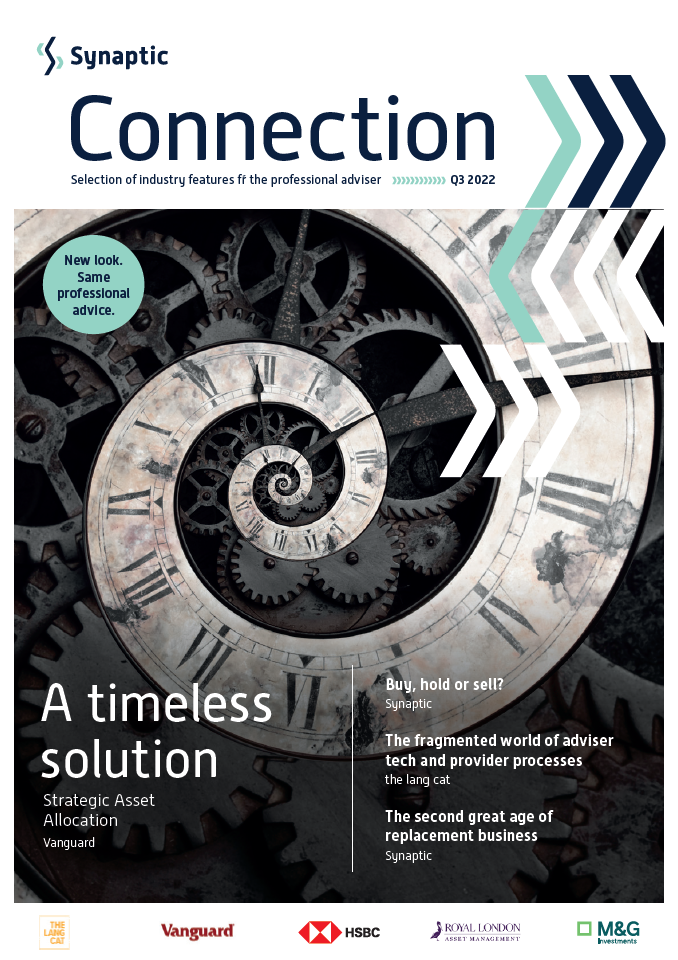In this edition...
- Strategic Asset Allocation: A timeless solution Vanguard,
- The second great age of replacement business Eric Armstrong, Client Director - Synaptic
- The fragmented world of adviser tech and provider processes Natalie Holt, Content Editor - the lang cat
- Will the Consumer Duty make your CIP obsolete Antony Champion, Head of Intermediaries - Brewin Dolphin
- Einstein, Benjamin Graham and Napoleon David Macfarlane, Team Head, Discretionary Wealth Management - HSBC Asset Management
- How IFAs can unlock a smooth ride Marc O’Sullivan, Head of Investments - Wesleyan
- Reliance on others Tim Cooper, Freelance Journalist on behalf of EBI
- Boom-bust economics is back! Be warned… John Pattullo, Co-Head of Strategic Fixed Income - Janus Henderson Investors
- Through a glass, darkly Guy Monson, Senior Partner and Chief Market Strategist - Sarasin & Partners
- Diversified income fund and impact Close Brothers , Asset Management
- Sustainable futures Mike Fox, Head of Sustainable Investments - Royal London Asset Management
- Morningstar Wealth Platform: now the real work gets underway Mark Sanderson, Director - Morningstar Wealth Platform
- A new capitalism Seeking value in Japanese equities M&G Investments,
- Is it the end of an era for the UK property market Andrew Robinson, Senior Investment Analyst - RSMR
- Buy, hold or sell? Either way, you need research to evidence your decision John Warby, Business Development Manager - Synaptic
 In times of volatility or uncertainty a common question from clients is ‘should I invest now, or do I wait for a better time?’ The cynic’s view is perhaps that there is never a good time to invest as there is always something to worry about.
In times of volatility or uncertainty a common question from clients is ‘should I invest now, or do I wait for a better time?’ The cynic’s view is perhaps that there is never a good time to invest as there is always something to worry about.
However, we know there is an opportunity cost of not investing, particularly given the current inflationary pressures, but it’s important we help clients understand that short term worries shouldn’t override their long-term objectives.
Einstein is rumoured to have said that ‘compound interest is the 8th wonder of the world - he who understands it, earns it... and he who doesn’t, pays it’. The simple message is, when it comes to investing, regardless of how volatile markets may seem to be, the earlier investors can start the better.
For example, we ran a study1 that compared two investors, each saving $1,000 dollars a month. One started in 2004 and the other in 2007. We ran it to the end of 2021. The investor who started in 2004 saved an extra $36,000 dollars into their pot (by starting 3 years earlier), but by the end of 2021 the earlier investor had a pot worth $133,000 dollars more – having only put in an extra $36,000 dollars. A great example of the power of compounding and the difference a delay in starting could cost in the long run.
But what about the worries your clients have of staying invested during falling markets,’ as short term views can perhaps over-ride the longer term. We know cash can be seen as a safe haven when there is uncertainty, as the value doesn’t appear to change from one day to the next, hence the question ‘should I stay invested?’ What does change though is what cash can buy as its value gets eroded by inflation.
Fuel is a great recent example that clients are all familiar with. A litre of unleaded was around £1 in June 2020. It’s now up around the £1.80 mark.
Let’s think about the behavioural aspect of this as well. Humans tend to avoid uncertainty. We don’t deal with it well. Cash brings certainty. It also brings a feeling of control. As the amount of cash in a savings account doesn’t really change from one day to the next, we feel in control of it, even if we aren’t seeing the impact of inflation on purchasing power.
Benjamin Graham, author of The Intelligent Investor, put this another way. He said, ‘you will be much more in control if you realise how much you are not in control’.
As asset managers we have control over risk profiles, asset allocation, fulfilment and cost. We, or any other investor, don’t have control of markets but by focusing on these elements and filtering the noise, we look to deliver strong risk adjusted returns, as we know these factors are key in driving long- term returns.
So, whilst behaviourally we prefer to avoid uncertainty, investing involves accepting degrees of uncertainty whatever our approach to risk.
We can’t control the market volatility so investors also may be asking themselves whether it’s worth selling down assets so they can then buy them back more cheaply later? Again, we would argue no – we believe, remaining invested is important.
Napoleon said, ‘A genius is the man who can do the average thing when everyone else around him is losing his mind’. Does ‘do the average thing’ mean remain invested? Basically, yes.
We looked at what would have happened if an investor had put $100,000 dollars into a basket of global equities from 2005 – 2022. Over those 17 years, just leaving things be, gave an average annual return of 8.1%.2 We then stripped out the top 20 days in that 17-year period. These accounted for only 0.3% of the total number of days but, crucially, by missing those 20 days in that 17-year period, returns dropped from an average 8.1% per year to 1.8% a year. This means that by missing the 20 best trading days, the final balance would have reduced from $380,000 to just over $136,000.
It’s simplistic, but this example highlights the importance of remaining invested.
Investors must also be comfortable with the volatility in their portfolio, taking on more risk than their comfortable with ultimately means they are more likely to feel panicked when market volatility picks up – with them looking to cash in or take funds out of their portfolios.
Given the speed at which information flows around the globe these days we often lose sight of the longer-term picture and spend time focussing on the here and now. We can check markets on our smartphone 24 hours a day, fretting that markets have fallen, forgetting why we’ve invested in the first place. So, when volatility picks up, it’s important to communicate to clients how time can be the most powerful force in investing and remembering the thoughts of Einstein, Graham and Napoleon.
About David Macfarlane
David has been at HSBC since 2002, looking after discretionary portfolios for private clients, trusts, pensions and corporate entities, and has been involved in the development and launch of the HSBC Global Managed Portfolio Service from inception. David has a BA in Business and is a Chartered Fellow of the Chartered Institute for Securities and Investment (CISI). He also manages the team of Discretionary Investment Specialists who cover the Central and North regions of the UK.
HSBC’s Global Managed Portfolio Service is actively managed against five risk profiles, with a long-term view and a focus on low-cost fulfilment, while taking advantage of the full resources and insight available to a global asset management firm.
To find out more visit:
https://www.assetmanagement.hsbc.co.uk/mps
Get in touch
Important Information:
For Professional Clients only
The material contained herein is for marketing purposes and is for your information only. This document is not contractually binding nor are we required to provide this to you by any legislative provision. It does not constitute legal, tax or investment advice or a recommendation to any reader of this material to buy or sell investments. You must not, therefore, rely on the content of this document when making any investment decisions. The value of investments and any income from them can go down as well as up and investors may not get back the amount originally invested. Approved for issue in the UK by HSBC Global Asset Management (UK) Limited, who are authorised and regulated by the Financial Conduct Authority. Copyright © HSBC Global Asset Management (UK) Limited 2022. All rights reserved. ED 3849.31.07.2023.
Footnotes.
- Source: Bloomberg, HSBC Asset Management. Investing = MSCI AWCI Net Return Index, 1 January 2004 to 31 December 2021.
- Source: HSBC Asset Management, Bloomberg, Returns are for developed markets stocks - MSCI World Daily Total Return Gross World Index, as at January 2022
Sign up for updates
Keep up to speed with everything you need to know each quarter, by email or post.


